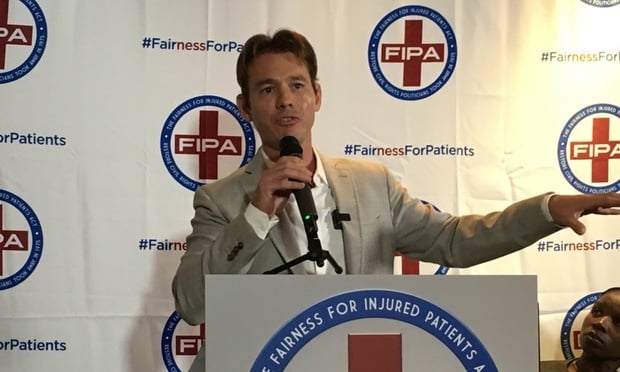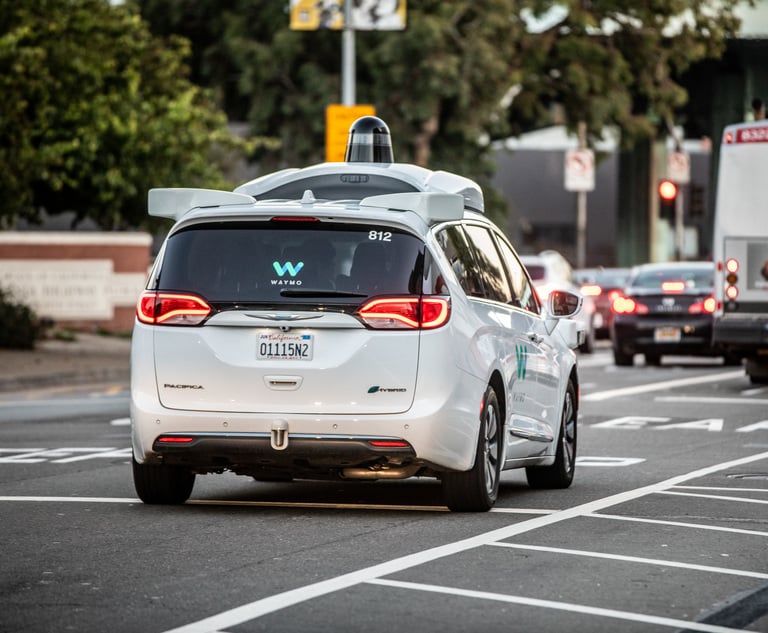New Ballot Campaign Against Medical Malpractice Caps Kicks Off
The event marked the start of what could be a months-long, multimillion-dollar effort to gather more than 623,000 valid signatures to put the measure before voters in November 2020.
December 16, 2019 at 06:59 PM
3 minute read
 Nicholas Rowley, a partner at Carpenter Zuckerman & Rowley. Photo: Cheryl Miller/ALM
Nicholas Rowley, a partner at Carpenter Zuckerman & Rowley. Photo: Cheryl Miller/ALM
Supporters of a proposed ballot initiative to lift, and in some cases eliminate, California's $250,000 cap on noneconomic damages in medical malpractice cases, kicked off their signature-gathering campaign in Sacramento on Monday.
The event marked the start of what could be a five-month-long, multimillion-dollar marathon to gather more than 623,000 valid signatures to put the measure before voters in November 2020.
"We're going to change things because it's the right thing to do," said plaintiffs lawyer Nicholas Rowley, a partner at Carpenter Zuckerman & Rowley who is spearheading the campaign with Santa Monica-based Consumer Watchdog.
The campaign kickoff was held at Frank Fat's, a Sacramento restaurant that was the scene of the so-called napkin deal, a 1987 agreement hashed out among legislative leaders and lobbyists representing lawyers, doctors and the tobacco industry. Spelled out on one of the restaurant's cloth napkins, the deal, among other things, gave plaintiffs lawyers access to higher contingency fees while keeping intact the medical malpractice caps enacted in 1975.
Families of malpractice victims and their political supporters, including former U.S. Sen. Barbara Boxer and Christine Pelosi, chair of the California Democratic Party's women's caucus, railed against the agreement and the cap itself. Gov. Jerry Brown signed the legislation creating the cap during his first year as governor and served as a blockade to any attempt to amend it during his administration's final eight years.
The initiative would tie the noneconomic damages cap to inflation, raising it to $1.2 million in today's dollars and adjusting it annually. Judges and juries would be allowed to award damages above the cap in cases involving "catastrophic" injuries and death. And the measure would bar evidence of collateral sources of victim support, such as insurance policies, and end mandatory periodic payments to plaintiffs.
Initiative backers said they had a scheduled meeting with Anthony Williams, Gov. Gavin Newsom's legislative secretary, Monday afternoon. The governor has not taken a public position on the measure. Rowley said he met with Newsom at a Southern California hotel lounge shortly before he launched his 2018 gubernatorial campaign.
"Gavin Newsom looked me in the eye and said, 'That law is wrong and it's got to change,'" Rowley said Monday. "Hopefully he'll stand up and say that to everybody else."
The governor's press office did not return a message seeking comment on the proposed initiative and Rowley's account of talking with Newsom.
Absent from Monday's event were leaders of the Consumer Attorneys of California, which lobbies for the plaintiffs bar in Sacramento. Organization executives have not taken a position on the initiative and have said previously that the malpractice law should be "corrected" in the Legislature, which returns to session next month.
Rowley said Monday that any legislation solution would have to go beyond simply raising the cap on damages.
A spokesman for Californians Allied for Patient Protection, an organization backed by health care and insurance interests that support of the malpractice cap law, did not return a message left Monday.
Read more:
Caps on Medical Malpractice Awards Could Face New Ballot Challenge
This content has been archived. It is available through our partners, LexisNexis® and Bloomberg Law.
To view this content, please continue to their sites.
Not a Lexis Subscriber?
Subscribe Now
Not a Bloomberg Law Subscriber?
Subscribe Now
NOT FOR REPRINT
© 2025 ALM Global, LLC, All Rights Reserved. Request academic re-use from www.copyright.com. All other uses, submit a request to [email protected]. For more information visit Asset & Logo Licensing.
You Might Like
View All

California Lawmakers Reach $50M Deal to Fund Legal Fights Against Trump
3 minute read

Trending Stories
Who Got The Work
J. Brugh Lower of Gibbons has entered an appearance for industrial equipment supplier Devco Corporation in a pending trademark infringement lawsuit. The suit, accusing the defendant of selling knock-off Graco products, was filed Dec. 18 in New Jersey District Court by Rivkin Radler on behalf of Graco Inc. and Graco Minnesota. The case, assigned to U.S. District Judge Zahid N. Quraishi, is 3:24-cv-11294, Graco Inc. et al v. Devco Corporation.
Who Got The Work
Rebecca Maller-Stein and Kent A. Yalowitz of Arnold & Porter Kaye Scholer have entered their appearances for Hanaco Venture Capital and its executives, Lior Prosor and David Frankel, in a pending securities lawsuit. The action, filed on Dec. 24 in New York Southern District Court by Zell, Aron & Co. on behalf of Goldeneye Advisors, accuses the defendants of negligently and fraudulently managing the plaintiff's $1 million investment. The case, assigned to U.S. District Judge Vernon S. Broderick, is 1:24-cv-09918, Goldeneye Advisors, LLC v. Hanaco Venture Capital, Ltd. et al.
Who Got The Work
Attorneys from A&O Shearman has stepped in as defense counsel for Toronto-Dominion Bank and other defendants in a pending securities class action. The suit, filed Dec. 11 in New York Southern District Court by Bleichmar Fonti & Auld, accuses the defendants of concealing the bank's 'pervasive' deficiencies in regards to its compliance with the Bank Secrecy Act and the quality of its anti-money laundering controls. The case, assigned to U.S. District Judge Arun Subramanian, is 1:24-cv-09445, Gonzalez v. The Toronto-Dominion Bank et al.
Who Got The Work
Crown Castle International, a Pennsylvania company providing shared communications infrastructure, has turned to Luke D. Wolf of Gordon Rees Scully Mansukhani to fend off a pending breach-of-contract lawsuit. The court action, filed Nov. 25 in Michigan Eastern District Court by Hooper Hathaway PC on behalf of The Town Residences LLC, accuses Crown Castle of failing to transfer approximately $30,000 in utility payments from T-Mobile in breach of a roof-top lease and assignment agreement. The case, assigned to U.S. District Judge Susan K. Declercq, is 2:24-cv-13131, The Town Residences LLC v. T-Mobile US, Inc. et al.
Who Got The Work
Wilfred P. Coronato and Daniel M. Schwartz of McCarter & English have stepped in as defense counsel to Electrolux Home Products Inc. in a pending product liability lawsuit. The court action, filed Nov. 26 in New York Eastern District Court by Poulos Lopiccolo PC and Nagel Rice LLP on behalf of David Stern, alleges that the defendant's refrigerators’ drawers and shelving repeatedly break and fall apart within months after purchase. The case, assigned to U.S. District Judge Joan M. Azrack, is 2:24-cv-08204, Stern v. Electrolux Home Products, Inc.
Featured Firms
Law Offices of Gary Martin Hays & Associates, P.C.
(470) 294-1674
Law Offices of Mark E. Salomone
(857) 444-6468
Smith & Hassler
(713) 739-1250






